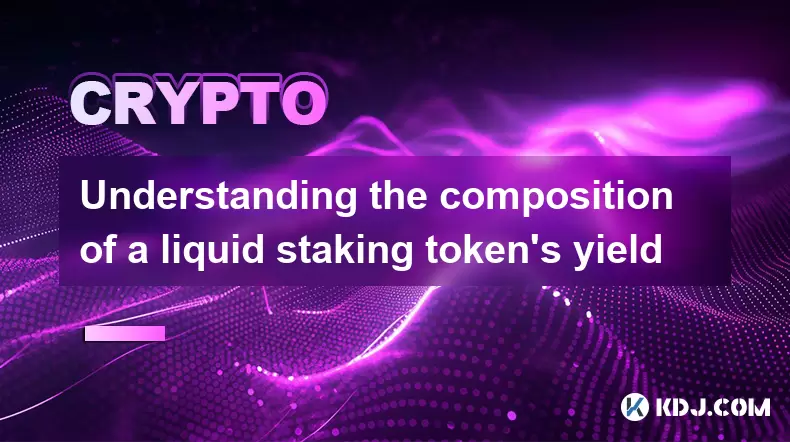-
 bitcoin
bitcoin $87959.907984 USD
1.34% -
 ethereum
ethereum $2920.497338 USD
3.04% -
 tether
tether $0.999775 USD
0.00% -
 xrp
xrp $2.237324 USD
8.12% -
 bnb
bnb $860.243768 USD
0.90% -
 solana
solana $138.089498 USD
5.43% -
 usd-coin
usd-coin $0.999807 USD
0.01% -
 tron
tron $0.272801 USD
-1.53% -
 dogecoin
dogecoin $0.150904 USD
2.96% -
 cardano
cardano $0.421635 USD
1.97% -
 hyperliquid
hyperliquid $32.152445 USD
2.23% -
 bitcoin-cash
bitcoin-cash $533.301069 USD
-1.94% -
 chainlink
chainlink $12.953417 USD
2.68% -
 unus-sed-leo
unus-sed-leo $9.535951 USD
0.73% -
 zcash
zcash $521.483386 USD
-2.87%
Best liquid staking platforms for Ethereum
Liquid staking lets Ethereum users earn rewards by staking ETH while maintaining liquidity through tokens like stETH or rETH, which can be used in DeFi for added yield.
Jul 18, 2025 at 02:35 pm

What Is Liquid Staking?
Liquid staking is a mechanism that allows users to stake their cryptocurrency assets, particularly Ethereum (ETH), while still retaining liquidity through the issuance of a tokenized representation of their staked assets. This enables users to participate in network validation and earn staking rewards without locking up their funds. In the Ethereum ecosystem, liquid staking platforms have become increasingly popular since the Merge upgrade, which transitioned Ethereum from a proof-of-work to a proof-of-stake consensus mechanism.
Why Use Liquid Staking Platforms?
Liquid staking platforms solve a major limitation of traditional staking — illiquidity. Normally, when you stake ETH, your funds are locked until certain network upgrades are completed. However, with liquid staking, you receive a derivative token, such as stETH or rETH, which represents your staked ETH and can be used across decentralized finance (DeFi) protocols. This allows users to earn additional yield by providing liquidity or using these tokens in lending protocols.
Top Liquid Staking Platforms for Ethereum
Several platforms have emerged as leaders in the liquid staking space. Each offers unique features and benefits that cater to different user preferences.
- Lido Finance — One of the most popular and widely adopted liquid staking platforms. It allows users to stake any amount of ETH and receive stETH in return. stETH can be used in various DeFi protocols to generate additional yield.
- Rocket Pool — A decentralized alternative to Lido that emphasizes trustless staking. It issues rETH as a liquid staking token and offers higher rewards for users who run their own node or deposit ETH as a minipool provider.
- Stakewise — This platform allows users to stake ETH and receive vETH in return. It operates on a pooled staking model and supports both solo and pooled staking strategies. It also offers cross-chain compatibility with Optimism and Arbitrum.
- Frax Finance — Known for its algorithmic stablecoin FRAX, Frax also offers a liquid staking solution called sfrxETH. Unlike other platforms, sfrxETH accrues rewards automatically without needing to be rebalanced or re-staked.
How to Use Lido Finance for Liquid Staking
Lido Finance is often the first choice for many Ethereum stakers due to its ease of use and integration with various wallets and DeFi protocols.
- Connect your wallet (e.g., MetaMask, WalletConnect) to the Lido Finance platform.
- Select the amount of ETH you want to stake and click the 'Stake' button.
- Confirm the transaction in your wallet and wait for it to be processed on the Ethereum blockchain.
- Once the transaction is complete, you will receive an equivalent amount of stETH in your wallet.
- You can now use stETH in DeFi applications such as Aave, Curve, or Balancer to earn additional yields.
How to Use Rocket Pool for Liquid Staking
Rocket Pool provides a more decentralized approach to liquid staking, allowing users to become node operators or simply deposit ETH for rETH.
- Visit the Rocket Pool website and connect your wallet.
- Choose to either deposit ETH for rETH or set up a node if you want to participate in validation directly.
- If depositing, enter the amount of ETH you wish to stake and confirm the transaction.
- After the transaction is confirmed, rETH will be minted and sent to your wallet.
- rETH can then be used in DeFi platforms or re-staked to compound your rewards.
Key Considerations When Choosing a Platform
Selecting the right liquid staking platform depends on several factors that users should carefully evaluate.
- Fee structure — Some platforms charge a performance fee or take a cut of the staking rewards. For example, Lido charges a 10% fee to node operators.
- Decentralization level — Rocket Pool is considered more decentralized than Lido because it relies on a network of independent node operators rather than centralized validators.
- Token liquidity and acceptance — The usefulness of the liquid staking token depends on how widely it is accepted in DeFi protocols. stETH is currently the most widely accepted.
- Security and audits — Always check whether the platform has undergone multiple third-party audits and has a strong track record of secure operations.
Frequently Asked Questions
Q: Can I unstake my ETH at any time on liquid staking platforms?A: Currently, ETH remains locked until the network enables withdrawals, which is expected in a future Ethereum upgrade. However, the liquid staking tokens you receive can be traded or used in DeFi to maintain liquidity.
Q: Are liquid staking tokens pegged to ETH?A: No, liquid staking tokens like stETH or rETH are not pegged 1:1 to ETH and may trade at a premium or discount depending on market demand and the platform’s performance.
Q: Do I need a minimum amount of ETH to stake on these platforms?A: No, platforms like Lido and Rocket Pool allow users to stake any amount of ETH, unlike traditional staking, which requires a minimum of 32 ETH to run a validator node.
Q: How are staking rewards distributed?A: Rewards are automatically reflected in the value of your liquid staking token. For example, stETH and rETH increase in value over time as staking rewards are accrued, meaning your token balance remains the same but each token represents more ETH.
Disclaimer:info@kdj.com
The information provided is not trading advice. kdj.com does not assume any responsibility for any investments made based on the information provided in this article. Cryptocurrencies are highly volatile and it is highly recommended that you invest with caution after thorough research!
If you believe that the content used on this website infringes your copyright, please contact us immediately (info@kdj.com) and we will delete it promptly.
- Beyond the Forecast: Is Carol Kirkwood's Departure a Whisper of BBC's Lingering 'Token Woman' Problem?
- 2026-02-01 16:25:01
- Bitcoin Plunges Amidst Liquidity Worries: A Record Low for Crypto Sentiment?
- 2026-02-01 16:25:01
- Pi Network's Mainnet: A Crypto Milestone Unveils a Complex Market Picture
- 2026-02-01 16:20:02
- Top Watch: Emerging Cryptocurrencies Charting New Territories in 2026
- 2026-02-01 16:15:01
- Wall Street Whales, DeFi Dynamos, and the Cross-Asset Surge: Decoding BTC, ETH, and Hyperliquid's Latest Plays
- 2026-02-01 13:00:02
- Dogecoin's Identity Crisis: From Meme Darling to Digital Identity Quandary
- 2026-02-01 16:15:01
Related knowledge

Understanding the composition of a liquid staking token's yield
Jul 20,2025 at 09:07am
What Is a Liquid Staking Token?A liquid staking token is a representative asset issued to users who stake their native cryptocurrency on a proof-of-st...

Is it better to stake directly or use a liquid staking service?
Jul 22,2025 at 08:21pm
Understanding the Basics of StakingStaking in the context of blockchain and cryptocurrency refers to the process of locking up digital assets to suppo...

What to do during an LST depeg event
Jul 20,2025 at 04:57pm
Understanding LST Depeg EventsAn LST (Liquid Staking Token) depeg event occurs when the token, which is typically pegged to the value of the underlyin...

How to find new liquid staking projects
Jul 30,2025 at 01:14pm
Understanding Liquid Staking and Its ImportanceLiquid staking is a mechanism that allows users to stake their cryptocurrency assets while still mainta...

Can you provide liquidity with liquid staking tokens?
Jul 22,2025 at 10:22am
Understanding Liquid Staking TokensLiquid staking tokens (LSTs) are derivative tokens that represent staked assets on a proof-of-stake (PoS) blockchai...

What are the best wallets for storing LSTs?
Jul 21,2025 at 03:14pm
Understanding LSTs and the Need for Secure StorageLSTs, or Liquid Staking Tokens, are derivative tokens representing staked assets on a blockchain. Wh...

Understanding the composition of a liquid staking token's yield
Jul 20,2025 at 09:07am
What Is a Liquid Staking Token?A liquid staking token is a representative asset issued to users who stake their native cryptocurrency on a proof-of-st...

Is it better to stake directly or use a liquid staking service?
Jul 22,2025 at 08:21pm
Understanding the Basics of StakingStaking in the context of blockchain and cryptocurrency refers to the process of locking up digital assets to suppo...

What to do during an LST depeg event
Jul 20,2025 at 04:57pm
Understanding LST Depeg EventsAn LST (Liquid Staking Token) depeg event occurs when the token, which is typically pegged to the value of the underlyin...

How to find new liquid staking projects
Jul 30,2025 at 01:14pm
Understanding Liquid Staking and Its ImportanceLiquid staking is a mechanism that allows users to stake their cryptocurrency assets while still mainta...

Can you provide liquidity with liquid staking tokens?
Jul 22,2025 at 10:22am
Understanding Liquid Staking TokensLiquid staking tokens (LSTs) are derivative tokens that represent staked assets on a proof-of-stake (PoS) blockchai...

What are the best wallets for storing LSTs?
Jul 21,2025 at 03:14pm
Understanding LSTs and the Need for Secure StorageLSTs, or Liquid Staking Tokens, are derivative tokens representing staked assets on a blockchain. Wh...
See all articles
























![[Audio stories] Streamer Became a Billionaire Overnight After Buying One Junk Coin [Audio stories] Streamer Became a Billionaire Overnight After Buying One Junk Coin](/uploads/2026/02/01/cryptocurrencies-news/videos/origin_697eaa9a495ed_image_500_375.webp)

















































